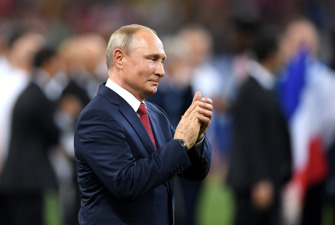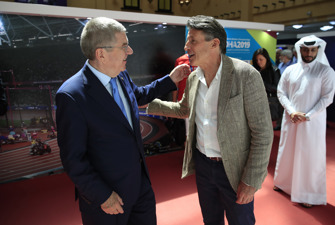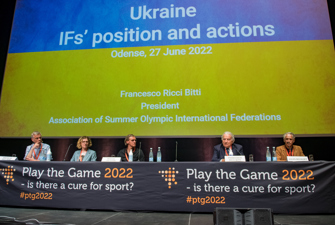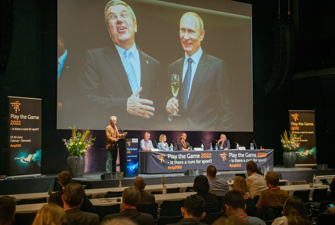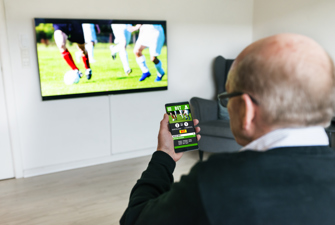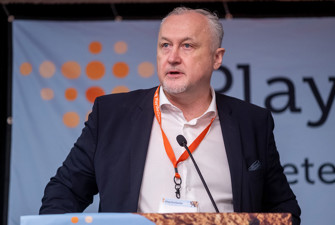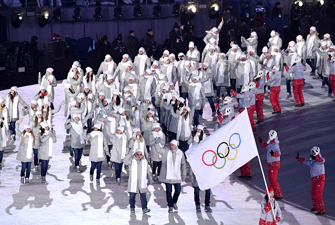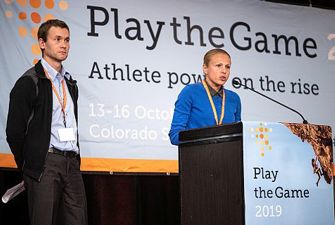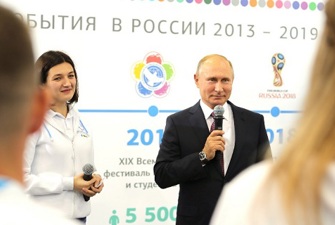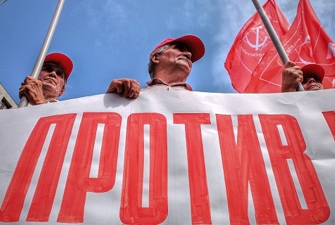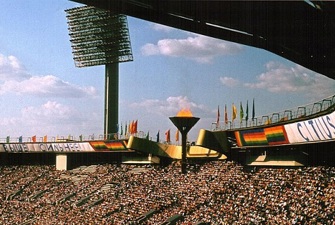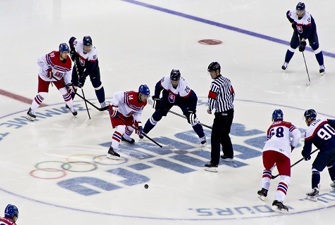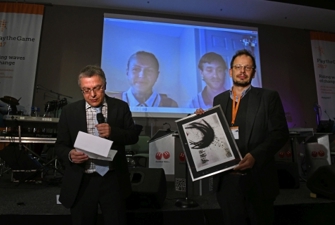Most Olympic federations suspend Russian athletes, but officials go free
Investigative reporter Jens Weinreich has reviewed how more than 100 international sports organisations have responded to Russia’s war of aggression in Ukraine. Both the IOC and the majority of federations still provide cover for Russian sport officials and national federations.
Six weeks after the start of the Russian war of aggression in Ukraine, almost all Olympic international federations (IF) have suspended Russian and Belarusian athletes from their competitions.
Among the current 32 Olympic summer and 8 Olympic winter IFs, there were only two exceptions:
First, the International Judo Federation (IJF), under the leadership of its President Marius Vizer, a long-time close friend of Russian President Vladimir Putin, could not bring itself to impose a ban. Vizer wanted to let Russians and Belarusians continue to compete as neutral athletes under the IJF flag. Finally, both national federations withdrew of their own accord in mid-March. Certainly this manoeuvre had been worked out with Vizer.
Second, World Skate, representing a new sport at the Olympics, published a clarification on 1 April and declared it “will not allow the participation of Russian and Belarusian athletes and officials in any of its international competitions, with immediate effect and until further notice”.
Reports and evidence of horrific war crimes and genocide against the Ukrainian population are mounting by the hour. Nevertheless, most of the Olympic federations and institutions used numerous tricks and shied away from tougher, truly drastic measures, as a data analysis reveals.
I have reviewed the decisions and postulates of more than 100 international sports organisations: the IOC, the 40 Olympic IFs, the other 35 IOC-recognised federations hoping for Olympic status, some 30 European Olympic federations, and several umbrella organisations such as the Association of Summer Olympic International Federations (ASOIF), Association of the International Olympic Winter Sports Federations (AIOWF), Association of IOC Recognised International Sports Federations (ARISF) and International World Games Association (IWGA).
The analysis reveals a huge discrepancy: Athletes from Russia and Belarus are widely suspended, even the horses from Russia and Belarus are suspended by the Equestrian federation - whereas top officials from Russia and Belarus are largely exempt from sanctions.
Also, hardly any national federations from Russia and Belarus have been suspended. Nor has the IOC banned the National Olympic Committees (NOC) of the two countries.
At the same time, almost all national associations and both NOCs are led by warmongers and long-standing, sometimes close paladins of the mass murderer Putin.
Seven out of 40 Olympic IFs suspended officials and national federations
Only 7 of 40 Olympic IFs have permanently suspended Russian and Belarusian officials. The few exceptions are: Luge, Bobsleigh and Skeleton, Biathlon, Canoeing, Sport Climbing, World Athletics, and World Rugby.
Only 7 out of 40 Olympic IFs have suspended warring national federations: Bobsleigh and Skeleton, Biathlon, Sport Climbing, Tennis, World Athletics, World Rugby, World Triathlon.
Belarus is not a member of all of the 40 Olympic IFs (for example, not in Luge or Bobsleigh/Skeleton). In other federations (such as Football and Basketball) only Russia, but not Belarus, was sanctioned. Also to be taken into account are the peculiarities in team sports such as cycling and tennis: Russian national teams, clubs and cycling teams are suspended, as is Russia's Davis Cup team in tennis - as individual athletes, however, Russians and Belarusians may continue to participate in tennis tournaments as well as to work for their employers abroad in the many team sports. We have tried to reflect this fact in the table below.
Table 1: Decisions by Olympic federations
|
Olympic |
Countries suspended |
Athletes suspended |
Officials suspended at |
Officials suspended permanently |
Exclusion of the national federation? |
|
BWF |
Russia/ |
Yes |
Not mentioned |
No |
No |
|
FEI |
Russia/ |
Yes |
Yes |
No |
No |
|
FIBA |
Russia |
Teams only |
Yes |
No |
No |
|
FIE |
Russia/ |
Yes |
Yes |
No |
No |
|
FIFA |
Russia |
Teams only |
No |
No |
No |
|
FIG |
Russia/ |
Yes |
Only lower level -highest officials remain |
No |
No |
|
FIH |
Russia/ |
Yes |
No |
No |
No |
|
FIL |
Russia |
Yes |
Yes |
Yes |
No |
|
FINA |
Russia/ |
Yes |
Yes |
No |
No |
|
FIS |
Russia/ |
Yes |
No |
No |
No |
|
FIVB |
Russia/ |
Teams only |
Yes |
No |
No |
|
IBA |
Russia/ |
Yes |
No |
No |
No |
|
IBSF |
Russia |
Yes |
Yes |
Yes |
Yes (until July congress) |
|
IBU |
Russia/ |
Yes |
Yes |
Yes |
Yes (until September congress) |
|
ICF |
Russia/ |
Yes |
Yes |
Yes |
No |
|
IFSC |
Russia/ |
Yes |
Yes |
Yes |
Yes |
|
IGF |
Russia/ |
Yes |
Yes |
No |
No |
|
IHF |
Russia/ |
Teams only |
Yes |
No |
No |
|
IIHF |
Russia/ |
Teams only |
No |
No |
No |
|
IJF |
Russia/ |
No (but RUS/BLR have withdrawn) |
No |
No (but Rotenberg) |
No |
|
ISA |
Russia |
Yes |
Yes |
No |
No |
|
ISMF |
Russia/ |
Yes |
Yes |
No |
No |
|
ISSF |
Russia/ |
Yes |
No |
No |
No |
|
ISU |
Russia/ |
Yes |
Yes |
No |
No |
|
ITF |
Russia/ |
Teams only |
No |
No |
Yes |
|
ITTF |
Russia/ |
Teams only |
Yes |
No |
No |
|
IWF |
Russia/ |
Yes |
Yes |
No |
No |
|
UCI |
Russia/ |
Teams only |
Yes |
No |
No |
|
UIPM |
Russia/ |
Yes |
Yes |
No |
No |
|
UWW |
Russia/ |
Yes |
Yes |
No |
No |
|
WCF |
Russia/ |
Yes |
No |
No |
No |
|
WDSF |
Russia/ |
Joins IOC (no own statement) |
Joins IOC (no own statement) |
No |
No |
|
World Archery |
Russia/ |
Yes |
Yes |
No |
No |
|
World Athletics |
Russia/ |
Yes |
Yes |
Yes |
Yes (since 2015, doping) |
|
World Rowing |
Russia/ |
Yes |
Yes |
No |
No |
|
World Rugby |
Russia |
Yes |
Yes |
Yes |
Yes |
|
World Sailing |
Russia/ |
Yes |
Yes |
No |
No |
|
World Skate |
Russia/ |
Yes |
Yes |
No |
No |
|
World Taek-wondo |
Russia/ |
Yes |
Yes |
No |
No |
|
World Triathlon |
Russia/ |
Yes |
Yes |
No |
Yes (since 2021, doping) |
A similar picture to the 40 Olympic IFs is revealed in my review of the non-Olympic international sports federations that are recognised by the IOC and the European Olympic federations.
The table, however, is limited to the 40 IFs - because the published resolutions and declarations of a total of more than 100 reviewed federations are very different in quality and content. There are even Olympic federations (for example, Dance Sports, World Skate, Curling) that, apart from a re-publication of IOC declarations, have hardly published a single sentence of their own - and certainly have provided no explanation of their own actions. Intransparency reigns.
Most Olympic IFs comply with IOC recommendations
Most of the 40 Olympic IFs have complied with the International Olympic Committee's (IOC) recommendations of February 28, 2022. On 1 March, there was a video conference on this with IOC president Thomas Bach and the international federations. Most of them announced their position immediately afterwards.
Everyone in the Olympic business knows that IOC statements are always more than recommendations. After all, the IOC has the power because it decides on the Olympic program: The majority of Olympic federations could not exist without their share from the Olympic TV contracts, which the IOC transfers after each Winter and Summer Games.
The IOC had recommended only minimum measures: no international competitions in Russia and Belarus (consistently fulfilled, except for the competitions of the Russians with the Belarusians), and no participation of athletes and officials of these warmongering nations in the respective events of the federations.
However, the IOC did not recommend permanent exclusion of officials and the national federations of Russia and Belarus.
Most IFs provide poor information with a few positive exceptions
The quality of the communications of the 40 Olympic IFs differs enormously. Comparatively positive are the publications of the federations in Luge, Canoeing, Cycling and Sport Climbing. With some reservations, Biathlon or Bobsleigh/Skeleton are also well comprehensible.
From the beginning, the International Luge Federation (FIL) correctly spoke of a military invasion of Russia in Ukraine. This may also be due to the fact that FIL president Einars Fogelis comes from Latvia. Already in its first detailed statement, the FIL left hardly any questions unanswered. If all federations had expressed themselves so decisively, the questions summarised in the table would have been easier to answer:
- Did the IF exclude Russian and Belarusian athletes from its competitions?
- Has the IF simultaneously excluded Russian and Belarusian officials from its competitions?
- Have officials from Russia and Belarus been permanently suspended from all other IF events, meetings, and congresses?
- Are the national federations from Russia and Belarus suspended completely by the IF?
Due to the mostly embarrassingly inadequate publications of the 40 federations, there may be deviations or different interpretations in individual cases. It may be that some federations will resist these representations and demand corrections. I sent several dozen inquiries and requests for clarifications during the research and data collection process. There have been few responses. On the positive side, ISBF (Bobsleigh and Skeleton) provided clarification within a few hours.
What is also alarming is this: Numerous officials said confidentially that the pressure from Russia was enormous and that they feared bad things for their associations and personally. The fear seems to be widespread.
At the very bottom of the scale of those IFs that had published only a few sentences at all on their decisions by the deadline of this analysis (April 1, 2022) are Fencing (where the Russian oligarch Alisher Usmanov has temporarily stepped aside as president), Modern Pentathlon (where three representatives from Russia and Belarus still sit on the board, among other officials with huge dependencies on Russia), Dance Sport, and Curling.
FIG (Gymnastics) communicated one of the most oblique decisions: Although athletes, judges and other officials at the simple working level are suspended, all high-ranking officials are explicitly excluded from the ban: "Russian and Belarusian nationals who are members of the FIG Executive Committee or of FIG technical committees are not affected by this measure when acting in their capacity as FIG Authorities."
In some cases - for example Swimming (FINA) or Judo (IJF) - the zigzagging of the federations over several weeks can hardly be integrated into statistics. In FINA, Russians and Belarusians were initially supposed to be allowed to continue competing as so-called neutral athletes. After protests from several national federations, they were excluded from the World Championships in June 2022 and all other FINA events. The Russians then withdrew their athletes for the entire year. And it was not until the end of March that the FINA Bureau decided to deny Kazan the 2022 World Short Course Championships.
Many IFs do not explicitly mention suspension of officials, not even the most important winter sport federation FIS (ski sports). But they almost all mention the IOC's recommendations. It seems that many IFs hide behind the IOC paperwork and do not even think of doing more.
In other words, the IOC has offered them a way out with minimal measures to save themselves over the next few months without taking decisive action. Just like the IOC itself does.
IFs avoid referring to a war in Ukraine
Highly questionable to this day is the choice of words of some IFs. In basketball (FIBA), as late as the end of March, there is only talk of a "situation in the Ukraine" - not of a Russian war of aggression. The fencing federation FIE has also avoided the term “war”. In the latest communication of the FIE, the Ukraine does not even appear. FIG first spoke only of a "conflict in Europe", later of a war. The wrestlers discussed "the conflict taking place in Ukraine."
The Modern Pentathlon Federation (UIPM) simply said "the humanitarian situation in Ukraine in the wake of the breach of the Olympic Truce by the Russian government and the government of Belarus."
UIPM president Klaus Schormann obviously did not want to say more about this, but a few days after the decision, the UIPM once again published a long article about the activities of the German president, who had come under heavy criticism, with endless details and several photos – a blatant contradiction to the publications on the war. By the way, on UIPM’s board are sitting two Russians and a Belarussian - a record among the IFs.
It is noticeable that those IFs in which the influence of Russia is traditionally particularly great, published the shortest and worst statements in terms of content: Fencing, Pentathlon, Boxing, and Shooting could be mentioned. Three of these Olympic IF are led by Russians: Usmanov (Fencing), Vladimir Lissin (Shooting), and Umar Kremlev (Boxing).
In addition to these three presidents, there are four Russian vice presidents, one secretary general and 20 board members from Russia and Belarus in the 40 Olympic IFs. Plus some honorary members. It may be that on the websites of the federations some Russians were already deleted - as in Judo (Arkady Rotenberg and Vladimir Putin himself). Also in this respect, the quality of the publications is extremely variable and made an analysis difficult.
Russian power in sport is waning, but fear remains
The Russians were much more powerful a few years ago, as evidenced by earlier data analyses, such as the Olympic Power Index I created in 2014 for a book on the IOC and which evaluated a total of about 1,500 officials from 146 nations in 127 federations.
But the "decade of Russian sport", with the 2014 Winter Games in Sochi and the 2018 Football World Cup, is long gone - and the sanctions from dealing with the Russian state doping system also means that the proportion of Russians in sports leadership positions has fallen significantly.
Among the 35 non-Olympic IFs recognized by the IOC, Russia has four presidents: Boris Skrynnik (Bandy), Arkady Dvorkovich (Chess), Vasily Shestakov (Sambo) and Anna Arshanova (Underwater Sports). All are still in office.
Among the European federations (not all of the 40 Olympic IFs have continental federations), Russia has five presidents: Stanislav Pozdnyakov (Fencing), who is also president of the Russian Olympic Committee (ROC); Tatyana Arbadyeva (Modern Pentathlon); Alexander Ratner (Shooting); Sergey Soloveychik (Judo); and Putin's official Kremlin aide Igor Levitin (Table Tennis), a former minister.
Levitin, like Usmanov in fencing, has temporarily retired from his posts. Soloveychik has resigned.
There are numerous other and sometimes absurd sporting political feints:
For example, in the International Equestrian Federation (FEI), Marina Sechina, the former wife of oligarch Igor Sechin of Putin's inner circle from St. Petersburg, has temporarily transferred her post to an official from Kyrgyzstan. Apparently, Sechina intends to resume work soon.
In shooting, Alexander Ratner, who as European president is also secretary general of the world federation ISSF, was declared an undesirable person at the European championships recently in Norway, as was ISSF President Lissin. Ratner nevertheless shows up in Hamar - allegedly as a private citizen and at his own expense.
The conflict of interest of ROC president Stanislav Pozdnyakov
In the European Fencing Federation, on the other hand, ROC president Pozdnyakov remains president, even though his national federation has gone to the Court of Arbitration for Sport (CAS) against the exclusion from competitions. Pozdnyakov does not acknowledge this conflict of interest. On the Eurofencing website a few days ago, he claimed that a vote of no confidence against him had failed. Neither the federation nor board members wanted to answer questions about who had initiated this vote of no confidence and how the vote had turned out. Pozdnyakov did not answer the questions either.
Russia's NOC president, in his dual role as Fencing president, had claimed, among other things "The matter is closed." I therefore wanted to know from him whether he meant the war. In addition, Pozdnyakov had announced, "Business continues as normal." To this I wanted to know if this is the official position of Eurofencing in view of a war in Ukraine, which Pozdnyakov demonstrably supports.
No answer.
In connection with Pozdnyakov and other warmongers among top officials, once again it is striking that no case is known in which one of the so-called ethics commissions of a federation or the IOC has acted.
The inexplicable unequal treatment between athletes and officials
However, in some cases of Russian athletes who participated in pro-war rallies or showed up at other events with the Z-symbol, disciplinary measures were initiated in several federations like gymnastics and swimming. In Luge - again, exemplary - the federation had declared after just a few days of war: "The FIL will open an investigation into certain derogatory and disturbing social media posts by Russian athletes against Ukraine."
Athletes are banned in most sports. Warmongers among the athletes, including many Olympic champions, are being investigated in several federations, but not in all – Russian and Belarusian officials, however, are not decisively prosecuted, although the burden of proof is overwhelming.
As established earlier: Only seven of 40 Olympic IFs have suspended national federations. The IOC itself does not act but continues to recognise the National Olympic Committees of Russia and Belarus – although the Belarusian committee has been partially sanctioned since late 2020.
The IOC also does not sanction its two Russian members, Yelena Isinbayeva and Shamil Tarpishchev, or its honorary members Vitaly Smirnov and Alexander Popov. The IOC has not even banned Russians from its numerous commissions.
Another of the many conflicts of interest: as president of the Russian Tennis Federation, IOC member Tarpishchev not only opposes the suspension by the International Tennis Federation (ITF), but also undermines IOC recommendations because he is planning an international competition for his own Kremlin Cup with athletes from former Soviet republics.
The IOC has also failed to respond in recent weeks to repeated verbal attacks by Vladimir Putin (at the start of the Paralympic Games in Khanty-Mansiysk), sports minister Oleg Matytsin, ROC president Pozdnyakov, and Deputy Prime Minister Dmitry Chernyshenko.
All these warmongers accuse organised sport, with the IOC at its top, of permanent violations of the Olympic Charter. They all claim, against all facts, that the sports sanctions against Russia are an inadmissible politicisation of sport against the only true Olympic nation heroically standing up for Olympic ideals - Russia.
Putin stated on March 20 in a video message:
"Unfortunately, in recent years, a lot of major international competitions have been marked by events that are incompatible with sports, its spirit and atmosphere. We have repeatedly witnessed dubious and biased judging, slander, aggressive acts, and outright provocations; we have seen how the ideas of Pierre de Coubertin are methodically falsified and distorted, and the once sacred principles of sports become blurred. Right before our eyes, equality turned into perverted tolerance, justice became double standards, and the fight for clean sport became a politically biased dictatorship of the anti-doping bureaucracy. The Olympic movement took a heavy blow with so-called shared responsibility, which was first launched by international sports officials at the Summer Games in Rio de Janeiro in 2016. All this leads not only to the loss of authority and independence of organizations that are important for the development of world sports but also to the violation of the Olympic Charter, including the key thesis that the Games are a competition between athletes, not between states."
This is exactly the message that Pozdnyakov, Matytsin and almost all other leading Russian officials have consistently advocated. Russia has long been in the process of dividing world sports and is setting up parallel structures.
And what is the IOC doing?
The IOC is silent. And the all-powerful IOC president Thomas Bach has been in hiding for weeks.
The Russian policy of partition
According to the Russians, more than 50 Russian federations have filed lawsuits against suspensions of athletes with the Court of Arbitration (CAS). Already, Russia and Belarus are preparing their own international competitions, to be elevated internally to the status of European and World championships. In the Belarusian capital of Minsk a few days ago, sports minister Matytsin and ROC president Pozdnyakov met with Belarusian NOC president Victor Lukashenko to agree on the next steps.
This meeting should also have provoked the IOC to a complete suspension of the NOCs of Russia and Belarus.
Even more so, since the IOC does not recognise the appointment of Lukashenko Jr. as NOC president and successor of his father and dictator Aleksandar Lukashenko. Moreover, both Lukashenkos, father and son, are on international sanctions lists.
ROC president Pozdnyakov, who as Europe's fencing president is taking his own federation to CAS, said in Minsk: "Unfortunately, the unprecedented politicisation of sport by a number of Western countries largely overrides the tremendous work being done by the National Olympic Committees and the governmental structures of our countries."
Putin's aide Igor Levitin, who met with Thomas Bach during the 2018 Winter Olympics in Pyeongchang and who recently suspended himself as Europe's Table Tennis president, said in Moscow this week that Russia's sport must return to the sport of the Soviet Union. That announcement, including plans for international competitions between the former Soviet republics, should also call for tougher sanctions.
Nothing is happening.
The alliance of sports rogue states against “the West”
Nothing can better illustrate the dangers and vast discrepancy of past decisions to ban athletes but continue to tolerate and do business with powerful officials in the Olympic family than scenes from the 72nd FIFA Congress in Doha, where I am finishing this article, on March 31:
While Russia's national team was barred from World Cup qualifying, Alexey Sorokin grinned into the cameras as one of the representatives of the Russian Football Union (RFU):
"We have every right to be here," Sorokin stated. Among other positions, Sorokin was the RFU's secretary general for many years, sat on the FIFA Council and was CEO of the 2018 World Cup Organizing Committee.
While Sorokin, one of the most important Russian sports officials of recent years, was at the FIFA Congress in his expensive tailored suit, enjoying the comforts of FIFA's luxurious hotels, Ukrainian football federation chief Andriy Pavelko was present in a video message - Pavelko was wearing a bulletproof vest. Whether he survives tomorrow or is killed by Russian attackers is in God's hands.
FIFA did not discuss Russia's exclusion in Doha. RFU president Alexander Dyukov, also CEO of state-owned Gazprom, even submitted a late Russian bid for the 2028 and 2032 European Championships a few days ago to the European Football Union (UEFA), where he remains on the board. At the same time, UEFA has suspended Russia's national team and terminated its sponsorship agreement with Russian state-owned energy company Gazprom at the beginning of March.
Sports politics are absurd.
And this will by no means be the last cynical escalation in the sports establishment. If the summit in Doha surrounding the draw for the 2022 Men's World Cup proved anything, it was this: FIFA, Qatar and Russia are sticking together as brothers. Come what may.
FIFA president Gianni Infantino and Qatar's World Cup organiser Hassan Al-Thawadi, who attended the Play the Game conference in Eindhoven in 2017, flatly accused "the West" of a vicious and mendacious bias against Qatar.
This criticism of "the West" follows a script where "the West" is just a synonym for almost everything that can be identified with a liberal, democratic set of values. The message was clear: anyone who stands up for such values and fundamental rights is interfering with FIFA's and Qatar's project.
It is exactly the same argumentation that is still fresh in memory from the Winter Olympics in Beijing. Back then it was the IOC and China's ruler Xi Jinping. Today it is FIFA president Infantino and Qatar's feudal ruler Emir Tamim Bin Hamad Al-Thani – both members of the IOC.
It is also the same argumentation we know from the 2014 irregular Sochi doping and corruption Olympics. And Russia is waging this propaganda campaign right now. Putin and his vassals in sports and politics, first and foremost ROC president Pozdnyakov, ultimately claim once more that "the West" is to blame for the war (officially: special military operation) in Ukraine, and that the global sanctions against Russian sports are political manoeuvrers directed by the West.
Gianni Infantino did not mention Putin's name in Doha. He also avoided the term war. "Terrible conflict" was one of the synonyms Infantino used. Then the inconceivably infantile sentence, "Obviously, the 2018 World Cup has not been able to solve all the world's problems." This was not irony at all but meant seriously.
On the Russia issue, everything followed a script, everything was finely attuned to the Qatari hosts of the most expensive World Cup ever. Qatar and Russia had already worked closely together in the run-up to FIFA’s totally corrupt World Cup decisions of December 2, 2010.
Qatar and Russia have since made a pact to defend the 2018 and 2022 World Cup projects against all best-founded attacks and investigations at numerous levels and topics. Qatar and Russia just recently renewed their sports partnership at a meeting in Moscow at a time when Putin already had children and women murdered and cities reduced to rubble in Ukraine.
Infantino and Qatar have set the tone for the rest of the year: The West - bad and mendacious. The near and far East and the South - good and the future. First Russia and China, now Qatar and Saudi Arabia. That's what it looks like, the new world order of sports.
And the Olympic institutions are plunging into ruin with their eyes wide open.
Therefore, the questions arise once more: What do Putin, his oligarchs and sports princes have on file that can compromise the IOC and the Olympic IFs? How enormous is the incriminating material (in Russian: compromat) that has been collected over several decades, also by Russian secret services? What earthquakes of revelations will we possibly experience? What are most officials and federations so afraid of that they behave so cautiously?
In terms of sports politics, this is a core issue of these terrible months. I already pointed this out in early March in another analysis on the links between Olympic sport and Russia: The corruptive connections of the Olympic world must be dealt with using criminalistic methods.
European politics - democratic governments, the European Union, the Council of Europe - must be committed to this. Every democratic sports politician must commit to this. The war crimes of Putin and his murdering hordes will certainly be tried before international tribunals. International sport also needs such absolutely independent, hard-hitting investigations.
What has happened at the top of the Olympic institutions so far is largely a disgrace, apart from aid operations for Ukraine. There is no justification for the fact that 33 Olympic IFs have not yet consistently banned the officials and federations of the aggressors. And there is no justification for the IOC not to have completely sanctioned the National Olympic Committees and excluded Russia and Belarus from the upcoming Olympic Games, both in Paris and Milano.


